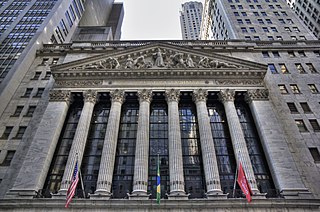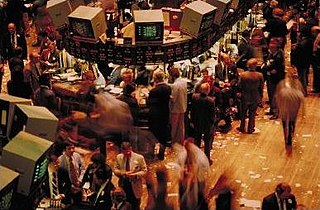Related Research Articles

A stock exchange, securities exchange, or bourse is an exchange where stockbrokers and traders can buy and sell securities, such as shares of stock, bonds and other financial instruments. Stock exchanges may also provide facilities for the issue and redemption of such securities and instruments and capital events including the payment of income and dividends. Securities traded on a stock exchange include stock issued by listed companies, unit trusts, derivatives, pooled investment products and bonds. Stock exchanges often function as "continuous auction" markets with buyers and sellers consummating transactions via open outcry at a central location such as the floor of the exchange or by using an electronic trading platform.

A capital market is a financial market in which long-term debt or equity-backed securities are bought and sold, in contrast to a money market where short-term debt is bought and sold. Capital markets channel the wealth of savers to those who can put it to long-term productive use, such as companies or governments making long-term investments. Financial regulators like Securities and Exchange Board of India (SEBI), Bank of England (BoE) and the U.S. Securities and Exchange Commission (SEC) oversee capital markets to protect investors against fraud, among other duties.

A stock market, equity market, or share market is the aggregation of buyers and sellers of stocks, which represent ownership claims on businesses; these may include securities listed on a public stock exchange, as well as stock that is only traded privately, such as shares of private companies which are sold to investors through equity crowdfunding platforms. Investment is usually made with an investment strategy in mind.

In finance, being short in an asset means investing in such a way that the investor will profit if the value of the asset falls. This is the opposite of a more conventional "long" position, where the investor will profit if the value of the asset rises.
A mutual fund is an investment fund that pools money from many investors to purchase securities. The term is typically used in the United States, Canada, and India, while similar structures across the globe include the SICAV in Europe and open-ended investment company (OEIC) in the UK.
In finance, a contract for difference (CFD) is a legally binding agreement that creates, defines, and governs mutual rights and obligations between two parties, typically described as "buyer" and "seller", stipulating that the buyer will pay to the seller the difference between the current value of an asset and its value at contract time. If the closing trade price is higher than the opening price, then the seller will pay the buyer the difference, and that will be the buyer’s profit. The opposite is also true. That is, if the current asset price is lower at the exit price than the value at the contract’s opening, then the seller, rather than the buyer, will benefit from the difference.

Security market is a component of the wider financial market where securities can be bought and sold between subjects of the economy, on the basis of demand and supply. Security markets encompasses stock markets, bond markets and derivatives markets where prices can be determined and participants both professional and non professional can meet.
Securities fraud, also known as stock fraud and investment fraud, is a deceptive practice in the stock or commodities markets that induces investors to make purchase or sale decisions on the basis of false information. The setups are generally made to result in monetary gain for the deceivers, and generally result in unfair monetary losses for the investors. They are generally violating securities laws.

Markets in Financial Instruments Directive 2014 commonly known as MiFID 2, is a legal act of the European Union. Together with Regulation (EU) No 600/2014 it provides a legal framework for securities markets, investment intermediaries, and trading venues. The directive provides harmonised regulation for investment services of the member states of the European Economic Area — the EU member states plus Iceland, Norway, and Liechtenstein. Its main objectives are to increase competition and investor protection, and level the playing field for market participants in investment services. It repeals Directive 2004/39/EC.

The Tehran Stock Exchange (TSE) is Iran's largest stock exchange, which first opened in 1967. The TSE is based in Tehran. As of May 2012, 339 companies with a combined market capitalization of US$104.21 billion were listed on TSE. TSE, which is a founding member of the Federation of Euro-Asian Stock Exchanges, has been one of the world's best performing stock exchanges in the years 2002 through 2013. TSE is an emerging or "frontier" market.

Securities research is a discipline within the financial services industry. Securities research professionals are known most generally as "analysts", "research analysts", or "securities analysts"; all the foregoing terms are synonymous. Research analysts produce research reports and typically issue a recommendation: buy ("overweight"), hold, or sell ("underweight"); see target price and trade idea.
Cross-listing of shares is when a firm lists its equity shares on one or more foreign stock exchange in addition to its domestic exchange. To be cross-listed, a company must thus comply with the requirements of all the stock exchanges in which it is listed, such as filing.
A non-banking financial institution (NBFI) or non-bank financial company (NBFC) is a financial institution that does not have a full banking license or is not supervised by a national or international banking regulatory agency. NBFC facilitate bank-related financial services, such as investment, risk pooling, contractual savings, and market brokering. Examples of these include insurance firms, pawn shops, cashier's check issuers, check cashing locations, payday lending, currency exchanges, and microloan organizations. Alan Greenspan has identified the role of NBFIs in strengthening an economy, as they provide "multiple alternatives to transform an economy's savings into capital investment which act as backup facilities should the primary form of intermediation fail."
A multilateral trading facility (MTF) is a European Union regulatory term for a self-regulated financial trading venue. These are alternatives to the traditional stock exchanges where a market is made in securities, typically using electronic systems. The concept was introduced within the Markets in Financial Instruments Directive (MiFID), a European Directive designed to harmonise retail investors protection and allow investment firms to provide services throughout the EU.
High-frequency trading (HFT) is a type of algorithmic financial trading characterized by high speeds, high turnover rates, and high order-to-trade ratios that leverages high-frequency financial data and electronic trading tools. While there is no single definition of HFT, among its key attributes are highly sophisticated algorithms, co-location, and very short-term investment horizons. HFT can be viewed as a primary form of algorithmic trading in finance. Specifically, it is the use of sophisticated technological tools and computer algorithms to rapidly trade securities. HFT uses proprietary trading strategies carried out by computers to move in and out of positions in seconds or fractions of a second.

The Cyprus Securities and Exchange Commission, better known as CySEC, is the financial regulatory agency of Cyprus. As an EU member state, CySEC's financial regulations and operations comply with the European MiFID financial harmonization law.
The 2015–2016 stock market selloff was the period of decline in the value of stock prices globally that occurred between June 2015 to June 2016. It included the 2015–2016 Chinese stock market turbulence, in which the SSE Composite Index fell 43% in just over two months between June 2015 and August 2015, which culminated in the devaluation of the yuan. Investors sold shares globally as a result of slowing growth in the GDP of China, a fall in petroleum prices, the Greek debt default in June 2015, the effects of the end of quantitative easing in the United States in October 2014, a sharp rise in bond yields in early 2016, and finally, in June 2016, the 2016 United Kingdom European Union membership referendum, in which Brexit was voted upon.
Research Exchange Ltd is a FinTech company servicing the global asset management industry operating under the trading name RSRCHXchange. Its platform, RSRCHX, is an online marketplace for unbundled financial research. RSRCHX provides asset management firms with a cloud-based repository of reports. Launched in September 2015, RSRCHX incorporates elasticsearch, compliance checks and Commission Sharing Agreement (CSA) and credit card payment administration. RSRCHXchange is one of a number of FinTech start-ups offering products which relate to MiFID II, the European Union financial reforms intended as a response to the financial crisis to improve the functioning of financial markets and enhance investor protection. RSRCHXchange's technology differs from other financial services vendors because its research catalogue is not dependent on RIXML, the industry-developed language for tagging documents. RSRCHXchange specialises in research unbundling, one of the most contentious topics of the regulation.
A Request for Quote (RfQ) is a financial term for certain way to ask a bank for an offer of a given financial instrument from a bank, made available by so-called Approved Publication Arrangement (APA) by the stock markets itself or by Financial data vendors as required in Europe by MiFID II and in effect since January 2018. A RFQ contains at least the ISIN to uniquely identify the financial product, the type, the amount, a currency, and the volume.

The principle of equivalence in financial services at the European Union (EU) level is one of the instruments the Commission has at its disposal to carry out its international strategy for financial services. The principle of equivalence is materialised through an equivalence decision issued by the European Commission to a targeted country that it judges fit to have access to the European Market in financial services. The decision is unilateral, non-reciprocal and affects the targeted third country in regard to particular activities or services to which the decision is intended. The equivalence decision is issued through an assessment of the third country regulations in relation to particular services or activities in the EU. In order to do so, the Commission bases its decision on 40 provisions of EU law. Important to note, perhaps is the fact that not all have been availed but over 250 equivalence decisions were made targeting more than 30 countries worldwide.
References
- 1 2 3 4 Regulation (EU) No 600/2014 of the European Parliament and of the Council of 15 May 2014 on markets in financial instruments and amending Regulation (EU) No 648/2012 Text with EEA relevance, 2014-06-12, retrieved 2019-09-14
- 1 2 3 Walker, Andrew (2019-07-02). "EU-Swiss share trading row: What does it mean?" . Retrieved 2019-09-14.
- 1 2 3 4 5 "MiFID II and the Importance of Equivalence Decisions" (PDF). Review of Banking & Financial Law. 37.
- ↑ "Switzerland's Stock-Trading Standoff With the EU Provides Post-Brexit Preview". Fortune. Retrieved 2019-09-14.
- ↑ "The EU tries to strong-arm Switzerland into a new trade deal". The Economist. 2019-05-09. ISSN 0013-0613 . Retrieved 2019-09-14.
- 1 2 "The consequences of Switzerland's lost equivalence status | Bruegel" . Retrieved 2019-09-14.
- ↑ "Swiss ready to retaliate against EU over stock market access". Reuters. 2019-06-24. Retrieved 2019-09-14.